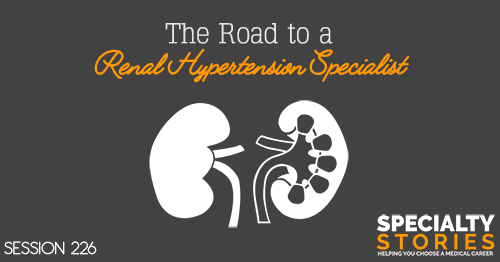Apple Podcasts | Google Podcasts

Session 122
Dr. Kenan Omurtag is interested in caring for patients, shaping policy, and more. He’ll walk us through the many opportunities in REI and what the future holds.
Reproductive Endocrinology and Infertility. Last week, we also had an REI specialist but more from the standpoint of a program director. This week, Kenan talks about his career as an academic REI OB/GYN.
Meanwhile, do share this podcast with your premed friends and colleagues as well as all other valuable resources on Meded Media.
Listen to this podcast episode with the player above, or keep reading for the highlights and takeaway points.
[01:28] Interest in REI
Kenan knew he wanted to go into REI at the same time he knew he wanted to go into OB/GYN. At 15, he went through Duke’s Talent Identification Program (more like a nerdy summer camp) back in 1997. He took a genetics course. This was back in 1997 where they just cloned Dolly, the sheep. They were talking about gene therapy and Kenan thought this would be cool to be at the frontier of this science.
Although his mom pushed him initially to take the genetics course, he thought he was cool learning about IVF and the “future of reproduction.” He was fascinated by it.
So he made that decision to follow down the OB/GYN path at an early age. He thinks it’s a fun job to talk about.
'It's going to be something that will be very satisfying to help people achieve a family.'Click To TweetHe didn’t have any personal experiences related to infertility. For him, it was purely the science, the fascinating conversations, and the ethical dilemmas he would be confronted with.
It was clear to him that there would be third party reproduction and same-sex couples needing options. He just felt this was a space he would do well in considering, too, that he was liberal about reproduction and autonomy.
He also felt he had good communication skills when it comes to relaying these issues to people as there would be a lot of interesting discussions involved around this.
On the other hand, Kenan was also interested in the health care policy and being a physician wasn’t the only thing he wanted to do.
He knew there would be some career he would want to have afterwards. This can be related to management, leadership, and policy; and women’s health is a great place for that.
He remembers his uncle who’s an OB/GYN who grew up in the good old days in OB/GYN when they were paid well and drug companies took him out to cruises. Later in his career, tort reform and suits became an issue, which led him to discourage Kenan from medicine. So it was really independent decision for him to get into medicine.
[05:50] What Are Tort Reforms?
OB/GYNs are at high risk of being sued because of some problems that may happen during birth. A bad outcome with laboring can result in a bad outcome for the baby. So it can be difficult for them to get malpractice insurance because it’s so expensive to cover their risk.
A tort reform is a term used to talk about how policymakers can change state laws to reduce the cost of malpractice insurance or if they don’t enact laws that keep the malpractice insurance high, which could result in loss of workforce.
[07:00] Is REI a Good Specialty for Someone That’s Not Liberal?
It is true that most of your patients will probably be women struggling with infertility and their partners. Most of them will women in relationships with men.
But you could be effectively reducing the amount of patients that you could actually help since there are a number of people in same-sex relationships that need access to tools to help them build their family.
Something eventually gives with individuals where they say they’re cool and can do it but they’re not out there advertising it. Or they just decide that the space is not for them.
In those scenarios, the practice tells the patients upfront or they go elsewhere. But in general, most REI clinics these days are out about their support for the LGBTQ couples and individuals.
Genuinely, there a lot of different ways to build a family. Kenan feels it’s important to help people understand what their choices are. Because there are a lot of people who are ready to exploit one’s vulnerability.
'It's important to make sure people have the right choices that are available and the right information, and most importantly, they have access.'Click To Tweet[09:30] Other Specialties Kenan Considered
Kenan was so committed to OB/GYN and REI from the get-go. When he did his introduction to a women course as a second-year medical student, he was turned off. He thought it wasn’t for him.
At that point, he was questioning his decision and wondering if there’s a path for medical endocrinology. But he wanted to do procedures and so he knew it wasn’t the right specialty for him.
Then he bounced back to ortho because of sports interest. But when he did the rotation, he knew it wasn’t for him.
[10:30] Types of Patients
They see a lot of patients who have some type of infertility whether a sperm factor, a tubal factor, or an ovary factor. Or they’re just trying to conceive. Some might just need assistance.
'While the majority of patients we see are infertility patients, it's not just infertility patients. That's why it's more fertility.'Click To TweetThey may see patients interested in freezing their eggs to prolong their reproductive lifespan. They also see patients who are ready to be confronted with chemotherapy and sterilizing treatments. They talk to them about egg-freezing, embryo-banking, or even sperm-freezing.
They see transgender patients who are ready to start cross-sex hormone therapy and might be interested in preserving their gametes as the therapy may disrupt their ability to make gametes in the future.
Some patients are struggling with endometriosis who have pain issues. They do complex medical management of it alongside their minimally invasive gynecologic surgeons.
REI specialists do a lot of pre-implantation genetic determination and this is another angle for fertility, not Infertility. There are patients who can be both carriers of an autosomal recessive disease and they want to make sure their next child doesn’t have that disease.
'Pre-implantation genetic testing in and of itself, as a tool for embryo selection, is increasingly more common however very controversial.'Click To TweetThey are seeing patients who are knowledgeable about pre-implantation genetic testing for bettering the embryo selection process. Their job is to educate them on the pros and cons of that tool and how it fits into their ideal plan.
[13:03] The Future of Sex
In order to reproduce, some people have this idea that you will go through a fertility clinic. They do this complex genetic panel that will pan screen you not just for genetic diseases but for all of these different traits.
Then you will select an embryo that will have varying likelihoods that your child will have these certain traits. This is probably coming in the next ten years. That being said, there are pros and cons to doing that, specifically ethical and moral discussions around that.
'The technology is there. It's just a matter of someone just stepping up and selling it.'Click To Tweet[14:00] Typical Week and Procedures
As a clinical educator, Kenan sees patients and have some protected time that the medical school pays so that he can help with medical student education.
He sees patients all-day Mondays, Tuesday mornings, Wednesdays, and Thursday afternoons. Then he’s in the O.R. on Fridays.
'The operating room is generally filled with minimally invasive gynecology procedures.'Click To TweetProcedures include operative hysteroscopies, cutting uterine septa, or removing fibroids from the uterus without any incisions. They may also remove the fibroids from the uterus from above with either laparoscopy or abdominally. Laparoscopy is also done to remove tubes that are diseased, endometriomas, or cysts.
Thirty years ago, the reproductive endocrinologist was the consonant laparoscopic gynecologic surgeon. But as IVF Has gotten better, the surgical skills of the reproductive endocrinologist have reduced.
Today, you see a rise in minimally invasive gynecology training and more training after residency. REIs are doing lots of hysteroscopies and some laparoscopy. And some of the complex laparoscopies are going to minimally invasive gynecologic surgeons. That said, the practice setting will primarily dictate REIs are going to do.
[16:50] The Biggest Myth Around REI
One of the biggest myths has to do with surgery and what ultimately is REI after training. Basically, you can do whatever after your training depending on what you want to do.
'REI after training can really be whatever you want it to be but you just have to find the right job opportunity.'Click To TweetIf you want more diversity in who you’re going to see, you want to see menopausal patients and so some hormone therapy and operate, there are jobs for you for that.
Part of going through the OB/GYN residency and trying to figure out what’s best for you is a function of where you are training.
When you’re deciding to do an OB/GYN residency, you really want to get a sense of being open to any subspecialty. You may want to go to a large academic program that has fellowships in all of the core subspecialties so you can get exposure to all those things.
[18:18] How to Be a Competitive Applicant
Objectively, you still want to be scoring well on your exams. It’s more competitive now than it was. Doing a project as a medical student in women’s health is a good idea because it gives you some opportunity to have something to publish.
It’s not a requirement but it looks good. And it doesn’t necessarily have to be in women’s health. Doing good on the OB/GYN rotations and helping out are great as well. It’s usually just doing the basic stuff.
'Demonstrating the ability to start a project and finish it – that alone is a huge accomplishment.'Click To Tweet[20:58] Advice to Future Primary Care Physicians
If you have a reproductive-aged female you’re seeing that is doing a well-woman exam, ask them if they’re trying to get pregnant. And if they say yes and have been doing it for more than a year, refer them to a reproductive endocrinologist.
A lot of folks may not be in spaces where they’re getting their adult health maintenance from an OB/GYN and they’re getting it from their primary care.
'Ask your patients if they're trying to get pregnant and if they are, direct them to a reproductive endocrinology fertility specialist.'Click To TweetIf there’s no reproductive endocrinologist available, definitely send them to the OB/GYN and they should be able to satisfy whatever the need is. And if they can’t, they will then direct them to a fertility specialist from there.
It’s usually a scheduled appointment. However, if that primary care is tied to cancer care, or they made a breast biopsy or did some biopsy that suggests cancer, understand that the patient is about to get exposed to chemotherapy. This could be sterilizing whether it’s male or female.
Talk to them or at least ask them to ask their oncologist about sperm or egg banking because there is a tight window for that. They need to see the fertility specialist ASAP if they’re interested.
'Find out who the nearest fertility specialist is in your area.'Click To TweetFor women diagnosed with cancer and they need chemotherapy, it takes two weeks to ramp up the hormones and get the eggs out. The REI sees them within 24 hours of the phone call and put them through the process. It doesn’t matter where they are in their cycle and they can start immediately.
For the guys, it’s pretty easy and straightforward.
[23:35] Special Opportunities Outside of Clinical Medicine
There are lots of opportunities in the fertility space. Kenan works as a consultant for a company called YO Sperm Test that sells a home sperm test kit that attaches to your mobile phone.
It gives you an FDA-approved readout consistent with the semen analysis results you could get with an automated semen analyzer. And you’d count motility in a video of your sample.
This is an option for people who live far away where they don’t have access to semen analysis. Kenan clarifies though that this doesn’t replace the semen analysis.
'Apps for the menstrual cycle are not that perfect but there are lots of venture capitalists that are willing to spend a lot of money on companies that are developing them.'Click To TweetThe genetic testing companies are finding opportunities to sell products. Private equity and venture capital can do a lot for the field. But there are also some concerns that it may not be entirely helpful to the patients in the long run.
[26:33] The Future of the Field
Kenan wished he had listened more to his mentors when they told him about the predictions they had on the future of the field. Most have been fairly accurate but there were also some things he never saw coming.
Kenan describes the field now as booming with increasing interest. It means there are more job opportunities. Large clinics are emerging and building new satellite facilities so job opportunities should be abundant in the coming 10-12 years.
Employers will recognize the value of providing fertility treatment benefits to their employees so there will be more people who will have access to fertility care.
'There will be more jobs. There will be more patients with access so there will be more need.'Click To TweetFrom a genetics standpoint, we’re moving towards noninvasive genetic testing of an embryo. Instead, you will just test the media that the embryo is cultured in and look for three DNA within the media. This may make embryo selection better.
Most clinics have well above 50% delivery rate for women under 35 and this could probably range up to 85%.
[30:15] Final Words of Wisdom
Reproductive endocrinology is a great field to be in. It’s booming. It’s a fun field. You will never have a dull moment. Kenan highly recommends reaching out to your local reproductive endocrinology. And if you don’t have one, reach out to a local clinic and ask them for an opportunity to shadow. Get an idea of what the work is like.
You will find that the doctor spends a lot of time managing patients who fail. And this is probably the most exhausting part of the specialty. They may not be successful but you can make sure they have a good experience.
Make sure everyone is nice on the phone or that the nurse responds in a timely fashion and that you respond in a timely fashion.
Kenan believes that REI is inherently the most patient-centric specialty in medicine. If this is not your speed, try to find some lane within REI that is not so patient-centric. it could be a research opportunity or something else.
'Not everyone who walks in the door will be successful but you have to make sure that they have a good experience because you can control that.'Click To TweetLinks:
SEARCH SITE
LISTEN FOR FREE











